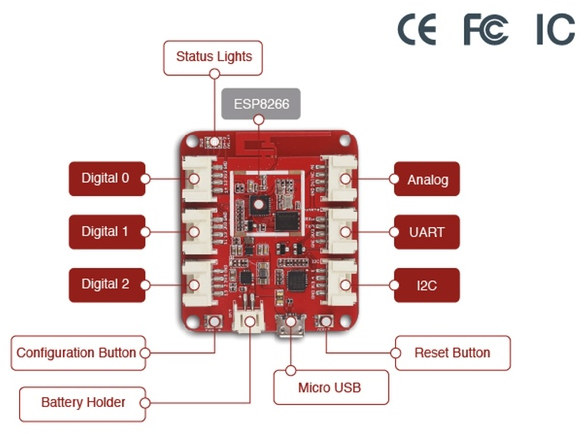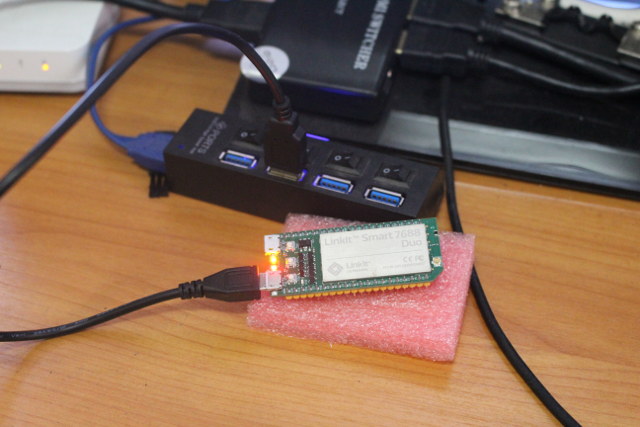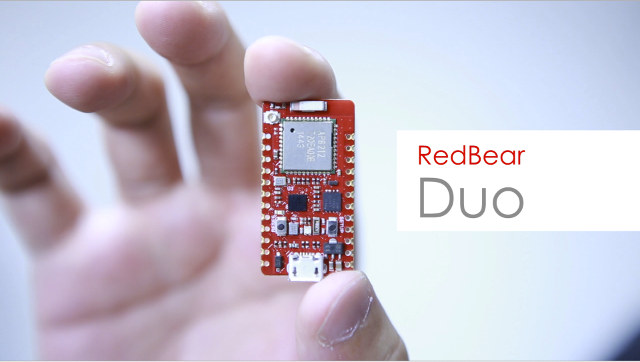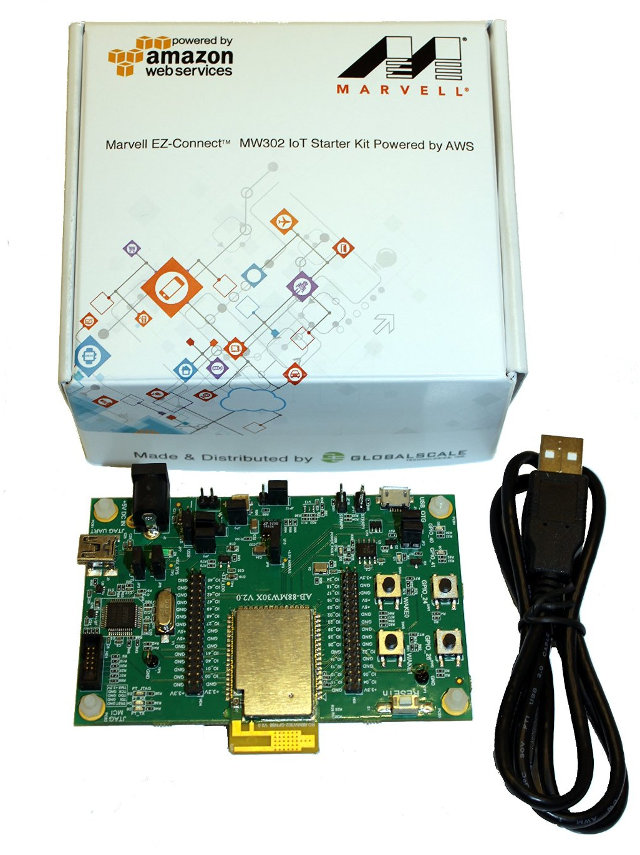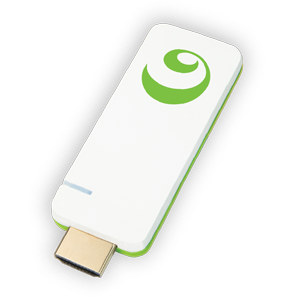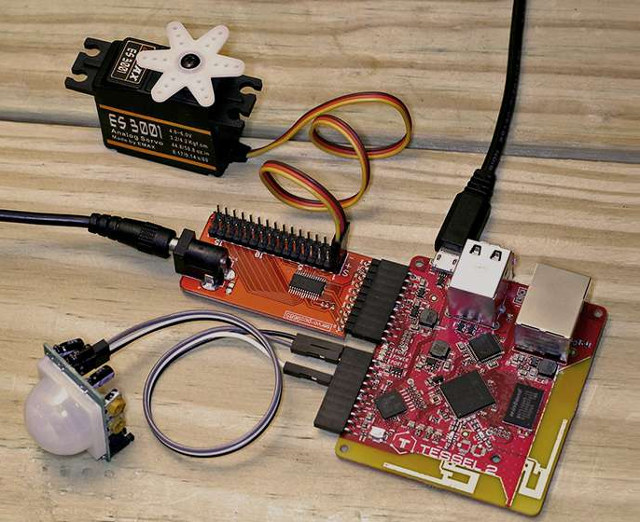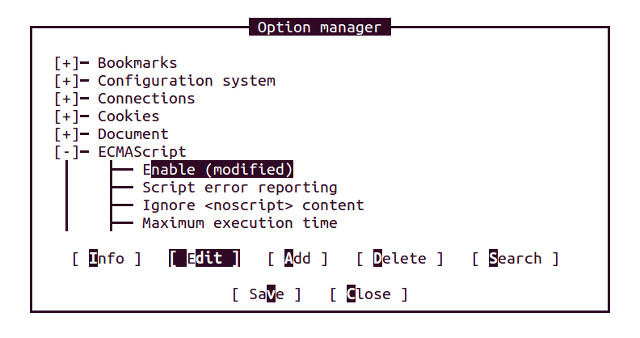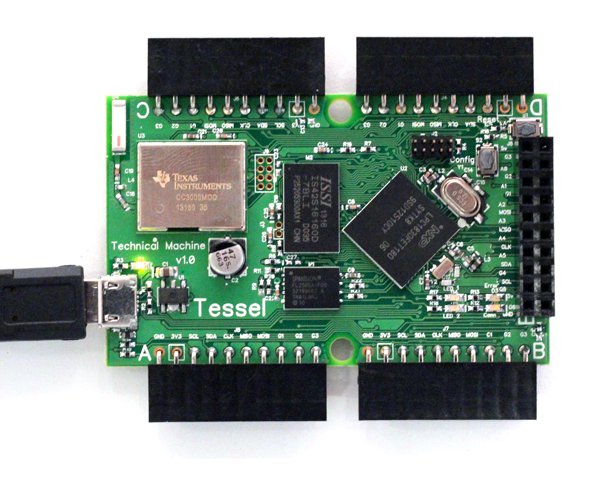There are already plenty of board or modules based on Espressif ESP8266 WiFi SoC, but if you don’t like soldering, or would rather avoid breadboards and some cables for your or your kids’ projects, Wio Link may be interesting, as all you need to is to connect Grove modules required for your applications to get started, and Seeed Studio also took care of the low level software part and a drag-and-drop mobile app is provided, so software programming has been made easy too. Wio Link hardware specifications: SoC – Espressif ESP8266EX Tensila SoC Storage – 4MB flash Connectivity – 802.11b/g/n WiFi, with WEP/TKIP/AES encryption support Expansion – 6x Grove connectors: 3x digital, 1x analog, 1x UART and 1x I2C (3.3V I/Os) Power Supply 5V via micro USB port 3.4 ~ 4.2V via external battery Output DC Current – 1000mA MAX Charge Current: 500mA MAX Dimensions – 55mm*48mm Weight – 26g […]
Quick Start Guide for LinkIt Smart 7688 (Duo) Board
Mediatek Labs has announced LinkIt Smart 7688 development boards powered by Mediatek MT7688 WiSoC earlier today, but I was selected for a close beta several weeks before the launch, and I’ve had time to play a little with the boards, so today I’ll report my experience getting started with LinkIt Smart 7688 amd 7688 Duo by writing a Quick Start Guide showing how to setup the boards, upgrade firmware, access the serial console, run “Blink LED” sample applications with Python and JavaScript, as well as the Arduino IDE, and connect to the Internet. Initial Setup You’ll only need a micro USB cable and a computer with WiFi and USB ports to get started with the board. The green LED (top) for the MCU will turn on immediately, while the red LED (bottom) for WiFI will blink once, and only turn on continuously after 5 seconds, and within 30 seconds after […]
RedBear Duo is a Breadboard-friendly Wi-Fi + BLE IoT Board Based on Ampak AP6212 Module (Crowdfunding)
I’ve taken apart lots of TV boxes and together with Realtek, Ampak are by far the most popular wireless modules to provide WiFi and Bluetooth connectivity in those devices. One startup decided to use Ampak AP6212 module, also found in NanoPi 2 board, to create a breadboard-friendly IoT board with Bluetooth 4.0 and 802.11b/g/n connectivity. Redboard Duo has been designed with the same form factor as many other IoT boards such as NodeMCU or Spark Photon, and features the following: Ampak AP6212 module: STMicroelectronics STM32F205 ARM Cortex-M3 @120MHz, 128 KB SRAM and 1MB Flash Broadcom BCM43438 Wi-Fi 802.11n (2.4GHz only) + Bluetooth 4.1 (Dual Mode) combo chip Storage – On-board 16 Mbit (2 MB) SPI Flash Integrated chip antenna with the option to connect external antenna Expansion – Headers with 18 I/O pins Misc – RGB status LED Dimensions – 20.5mm x 39mm The company also made a small baseboard called RBLink with […]
Marvell EZ-Connect MW302 IoT Starter Kit Supports AWS IoT Cloud Services
Amazon has just launched AWS (Amazon Web Services) IoT (Beta), a cloud platform that lets connected devices securely interact with cloud applications and other IoT devices. As pasrt of the announcement, they also released AWS IoT SDK that comes in three flavors: Embedded C SDK for C-based platforms such as Linux, RTOS, with variants for OpenSSL and mbed TLS. JavaScript SDK in Node.js Arduino Yún SDK. Ten started kits are currently officially supported by AWT IoT, many of them being existing platforms such as LinkIt One, BeagleBone Green, Intel Edison, or TI LaunchPad CC3200, with several of these kits including SeeedStudio’s Grove modules. One of the kits that’s completely new, at least to me, is Marvell EZ-Connect MW302 IoT Starter Kit which include a mini USB to USB cable, and Marvell 88MW302 development board with the following (preliminary) specifications: SoC – Marvell EZ-Connect MW302 ARM Cortex-M4 WiSoC with 512KB SRAM […]
Kinoma HD is $25 TV Stick Devkit Based on Marvell ARMADA 1500 Mini Plus Processor
Marvell has just revealed that ChromeCast 2.0 & Audio featured their ARMADA 1500 Mini Plus (88DE3006) processor with two ARM Cortex A7 cores, coupled with 512 MB RAM, and Avastar 88W8887 wireless solution with WiFi 802.11 b/g/n/ac, Bluetooth 4.1, NFC and FM radio. But a comment on Anandtech lead me to a development kit based on 88DE3006 I missed while I was away: Kinoma HD. Preliminary hardware specifications: SoC – Marvell ARMADA 1500 Mini Plus (88DE3006) dual core Cortex A7 @ 1.2 GHz with 3D GPU supporting OpenGL ES 1.1/2.0, Qdeo video engine System Memory – 256 MB RAM Storage – TBD Video Output – HDMI output of 1080p/720p Connectivity – Wi-Fi g/n/ac Power Supply – 5V via micro USB port Apart for the lower memory capacity (256MB vs 512MB), Kinoma HD hardware looks pretty similar to ChromeCast 2.0. But the main difference is in the software, as while ChromeCast […]
$35 Tessel 2 IoT Board Features Atmel SAMD21 MCU and Mediatek MT7620n WiSoC
Tessel is a Wi-Fi IoT board based on NXP LPC1830 Cortex M3 MCU and Texas Instruments CC3000 modules, that’s designed to bring embedded development to web programmers with a system that can be programmed with JavaScript and Node.js. At the time of the crowdfunding campaign in 2013, the board was available with external modules (Relays, sensors, Bluetooth LE…) for $100 and up, but now Technical Machine, the company behind the project, has announced Tessel 2 combining Atmel SAMD21 Cortex M0+ to control I/O and Mediatek MT7260n for Wi-Fi connectivity, still programmable with JavaScript ot Node.js. Tessel 2 specifications: MCU – Atmel SAMD21G14A-MU Cortex M0+ MCU @ 48MHz with 16KB SRAM and 2KB Flash SoC – Mediatek MT7260n MIPS24KEc Wi-Fi SoC @ 580 MHz System Memory – 64MB DDR2 Storage – 32MB flash for firmware (OpenWRT) Connectivity – 10/100M Ethernet, and Wi-Fi 802.11 b/g/n with dual PCB antennas USB – 2x […]
Building eLinks Text-based Web Browser with (Some Sort of) JavaScript Support
Yesterday, I’ve spend some time trying to find a text-based web browser with support for JavaScript. Although I doubt many people would need that, I’ll post my findings, and show how to build and enable Javascript in eLinks web browser to access the web from a terminal in Linux (Ubuntu/Debian). Bear in mind that the implementation is far from complete, and most pages won’t work, at least for now. Initial research pointed me to three potential candidates: links2, w3m + w3m-js extension, and elinks. Links2 used to have JavaScript, but support was poor, so they decided to remove it. w3m-js is an experimental patch to add JavaScript to w3m, but the link is broken, so we are left with elinks. If you just want a text based web-browser, and do not care about JavaScript, you can just install links2, w3m, or elinks with apt-get. The versions I’ve tried in Ubuntu […]
Tessel ARM Cortex-M3 MCU Board Brings Hardware Hacking to Web Developers with JavaScript and Node.js
People who are proficient with JavaScript or web technologies may not be completely comfortable with programming MCU in assembler and/or C programming language. Node.js, written in JavaScript, seems to be quite popular this days for diverse projects, but technical.io has decided to design a board called Tessel, powered by a Cortex M3 MCU. that can be fully programmed with JavaScript/Node.js. Tessel hardware specifications: MCU – NXP LPC1830 ARM Cortex-M3 @ 180mhz System Memory – 32MB SDRAM Storage – 32MB Flash Connectivity – Wi-Fi via TI CC3000 Expansion – 16-pin GPIO bank for prototyping Power – Micro USB or battery The board is said to be compatible with 1000’s of Node.js modules from NPM, can be programmed via USB or Wi-Fi using your own IDE, and support Tessel modules, as well as Arduino Shields. There are two (price) classes for Tessel modules: Class A: Relay — turn devices on and off (up […]


